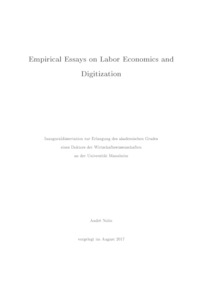|
Empirical essays on labor economics and digitization
Nolte, André
![[img]](https://madoc.bib.uni-mannheim.de/43085/1.hassmallThumbnailVersion/NolteAndre_Dissertation.pdf)  Vorschau |
|
PDF
NolteAndre_Dissertation.pdf
- Veröffentlichte Version
Download (2MB)
|
|
URL:
|
https://madoc.bib.uni-mannheim.de/43085
|
|
URN:
|
urn:nbn:de:bsz:180-madoc-430852
|
|
Dokumenttyp:
|
Dissertation
|
|
Erscheinungsjahr:
|
2017
|
|
Ort der Veröffentlichung:
|
Mannheim
|
|
Hochschule:
|
Universität Mannheim
|
|
Gutachter:
|
Weber, Andrea
|
|
Datum der mündl. Prüfung:
|
12 Oktober 2017
|
|
Sprache der Veröffentlichung:
|
Englisch
|
|
Einrichtung:
|
Fakultät für Rechtswissenschaft und Volkswirtschaftslehre > VWL, Angewandte Politische Ökonomie (Weber, A. 2010-2016)
|
|
Fachgebiet:
|
330 Wirtschaft
|
|
Normierte Schlagwörter (SWD):
|
Arbeitsökonomie
|
|
Freie Schlagwörter (Englisch):
|
Labor Economics , Crime , Internet , Media, Wage
|
|
Abstract:
|
This dissertation analyzes how two major events during the last three decades in Germany affect overall societal outcomes. These events are first the digitization of the economy and society through broadband internet and second the Reunification of East with West Germany. Both can be characterized as historical quasi-natural experiments at the macroeconomic level with profound impacts on individuals. The thesis covers two aspects of the economics of digitization: the effects of the introduction of broadband internet on crime, in particular sex crime and murder, and on the employment prospects among unemployed individuals. First, in a single-authored chapter, I show that broadband internet and sex crime are substitutes. The substitution effect operates through child sex abuse, whereas broadband internet has no effect on rape and murder. Second, in a joint chapter with Nicole Gürtzgen, Laura Pohlan and Gerard van den Berg, we show that high-speed internet leads to shorter unemployment durations. This effect is especially pronounced for unemployed males. Moreover, we document a positive effect on wages for male job seekers. The last chapter of the thesis covers one aspect in the field of transition economics. In a joint chapter with Nicole Gürtzgen we show that individuals at the lower end of the wage distribution under the socialistic regime of the German Democratic Republic (GDR) have a higher probability of low-wage employment during the first years after Reunification with West Germany. Already in the mid-1990s the effect reverses - formerly low-wage workers are catching up in terms of low-wage employment probability - and becomes essential zero thereafter.
|
 | Dieser Eintrag ist Teil der Universitätsbibliographie. |
 | Das Dokument wird vom Publikationsserver der Universitätsbibliothek Mannheim bereitgestellt. |
 Suche Autoren in Suche Autoren in
Sie haben einen Fehler gefunden? Teilen Sie uns Ihren Korrekturwunsch bitte hier mit: E-Mail
Actions (login required)
 |
Eintrag anzeigen |
|
|
